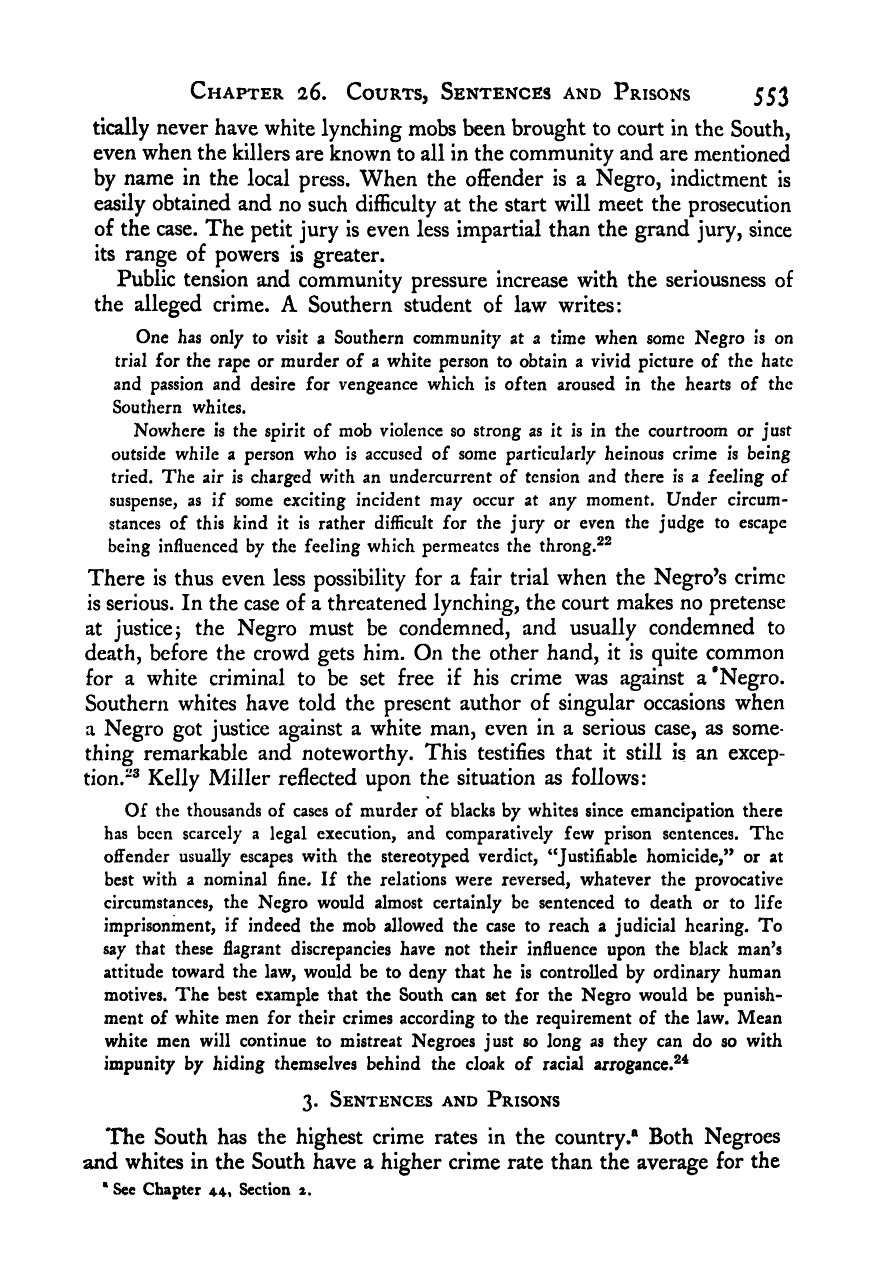Note: Gunnar Myrdal died in 1987, less than 70 years ago. Therefore, this work is protected by copyright, restricting your legal rights to reproduce it. However, you are welcome to view it on screen, as you do now. Read more about copyright.
Full resolution (TIFF) - On this page / på denna sida - VI. Justice - 26. Courts, Sentences and Prisons - 2. Discrimination in Court - 3. Sentences and Prisons

<< prev. page << föreg. sida << >> nästa sida >> next page >>
Below is the raw OCR text
from the above scanned image.
Do you see an error? Proofread the page now!
Här nedan syns maskintolkade texten från faksimilbilden ovan.
Ser du något fel? Korrekturläs sidan nu!
This page has never been proofread. / Denna sida har aldrig korrekturlästs.
Chapter 26. Courts, Sentences and Prisons 553
tically never have white lynching mobs been brought to court in the South,
even when the killers are known to all in the community and are mentioned
by name in the local press. When the offender is a Negro, indictment is
easily obtained and no such difficulty at the start will meet the prosecution
of the case. The petit jury Is even less impartial than the grand jury, since
its range of powers is greater.
Public tension and community pressure increase with the seriousness of
the alleged crime. A Southern student of law writes:
One has only to visit a Southern community at a time when some Negro is on
trial for the rape or murder of a white person to obtain a vivid picture of the hate
and passion and desire for vengeance which is often aroused in the hearts of the
Southern whites.
Nowhere is the spirit of mob violence so strong as it is in the courtroom or just
outside while a person who is accused of some particularly heinous crime is being
tried. The air is charged with an undercurrent of tension and there is a feeling of
suspense, as if some exciting incident may occur at any moment. Under circum-
stances of this kind it is rather difficult for the jury or even the judge to escape
being influenced by the feeling which permeates the throng.^^
There is thus even less possibility for a fair trial when the Negro’s crime
is serious. In the case of a threatened lynching, the court makes no pretense
at justice j
the Negro must be condemned, and usually condemned to
death, before the crowd gets him. On the other hand, it is quite common
for a white criminal to be set free if his crime was against a*Negro.
Southern whites have told the present author of singular occasions when
a Negro got justice against a white man, even in a serious case, as some-
thing remarkable and noteworthy. This testifies that it still is an excep-
tion."® Kelly Miller reflected upon the situation as follows:
Of the thousands of cases of murder of blacks by whites since emancipation there
has been scarcely a legal execution, and comparatively few prison sentences. The
offender usually escapes with the stereotyped verdict, “Justifiable homicide,” or at
best with a nominal fine. If the relations were reversed, whatever the provocative
circumstances, the Negro would almost certainly be sentenced to death or to life
imprisonment, if indeed the mob allowed the case to reach a judicial hearing. To
say that these flagrant discrepancies have not their influence upon the black man’s
attitude toward the law, would be to deny that he is controlled by ordinary human
motives. The best example that the South can set for the Negro would be punish-
ment of white men for their crimes according to the requirement of the law. Mean
white men will continue to mistreat Negroes just so long as they can do so with
impunity by hiding themselves behind the cloak of racial arrogance.^^
3. Sentences and Prisons
’The South has the highest crime rates in the country.® Both Negroes
and whites in the South have a higher crime rate than the average for the
* See Chapter 44i Section 2.
<< prev. page << föreg. sida << >> nästa sida >> next page >>